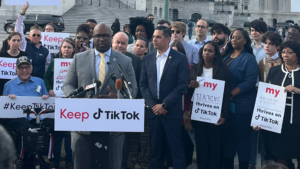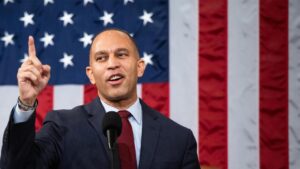
US House Passes Landmark Bill Potentially Banning TikTok in America
The US House of Representatives has passed a significant bill with potential repercussions for TikTok’s presence in America. Under the proposed legislation, the Chinese parent company, ByteDance, would have six months to divest its controlling stake in TikTok, failing which the app could be banned in the US. Although the bill received broad bipartisan support in the House, it still awaits approval in the Senate and the president’s signature to become law.

Approximately 30 TikTok influencers and their accompanying supporters voiced opposition to the bill at Capitol Hill on Wednesday. They vocalized slogans such as “Keep TikTok” in anticipation of the vote. Additionally, they displayed placards bearing messages such as “TikTok changed my life for the better” and “TikTok helped me grow my business.”
Concerns regarding China’s influence over TikTok have long been held by lawmakers. TikTok, owned by ByteDance, operates under the shadow of these concerns, with the company being headquartered in Beijing but registered in the Cayman Islands, with offices scattered across Europe and the US.
Similar to numerous other social media platforms, including those under U.S. ownership, there are apprehensions regarding the extensive collection of personal user data by ByteDance, TikTok’s parent company based in Beijing, which raises national security concerns.
Should the bill pass the Senate hurdle, President Joe Biden has pledged to sign it promptly, potentially straining US-China relations. ByteDance would be compelled to seek approval from Chinese authorities for a forced divestiture, a move China has vehemently opposed. Mike Gallagher, a Wisconsin Republican co-authoring the bill, underscored the risk of having a major news platform controlled by a company with ties to the Chinese Communist Party.
The issue of data security looms large in this debate. Despite TikTok’s efforts to reassure regulators about data protection measures, concerns persist about data sharing between TikTok in the US and ByteDance in China. Instances of data breaches, including one where ByteDance employees accessed a journalist’s data, have fueled apprehensions.
The bill’s proponents argue that it is necessary to safeguard national security and protect user privacy from foreign influence. However, opposition to the bill exists, with some fearing it could jeopardize jobs and alienate TikTok’s youthful user base.

Leaders of the Senate intelligence committee have welcomed the House vote, emphasizing the national security threat posed by TikTok’s parent company’s allegiance to the Chinese Communist Party.
TikTok, meanwhile, has intensified efforts to rally user support, urging them to lobby Congress. However, protests against the bill outside the White House underscore the deep divisions and concerns about its impact on individuals and businesses.
In response to criticisms, the Chinese foreign ministry accused the US of unjustly targeting TikTok and disrupting normal business activities. The White House countered, asserting that the bill aims to prevent tech platforms from falling into the wrong hands.
TikTok has consistently refuted any assertions that it could serve as an instrument of the Chinese government. The company has maintained that it has never disclosed U.S. user data to Chinese authorities and has pledged not to do so if requested. Thus far, the U.S. government has not presented evidence demonstrating TikTok’s sharing of such information with Chinese authorities.
Even if ByteDance agrees to sell its stake in TikTok, uncertainties loom over potential buyers and regulatory hurdles. While the app’s advertising revenue continues to soar, its fate in the US remains uncertain amidst geopolitical tensions and regulatory scrutiny.